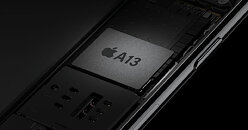- Joined
- Oct 9, 2007
- Messages
- 47,670 (7.43/day)
- Location
- Dublin, Ireland
| System Name | RBMK-1000 |
|---|---|
| Processor | AMD Ryzen 7 5700G |
| Motherboard | Gigabyte B550 AORUS Elite V2 |
| Cooling | DeepCool Gammax L240 V2 |
| Memory | 2x 16GB DDR4-3200 |
| Video Card(s) | Galax RTX 4070 Ti EX |
| Storage | Samsung 990 1TB |
| Display(s) | BenQ 1440p 60 Hz 27-inch |
| Case | Corsair Carbide 100R |
| Audio Device(s) | ASUS SupremeFX S1220A |
| Power Supply | Cooler Master MWE Gold 650W |
| Mouse | ASUS ROG Strix Impact |
| Keyboard | Gamdias Hermes E2 |
| Software | Windows 11 Pro |
Apple is planning to launch its own high-performance processors designed for Macs at the 2020 WWDC, held in the week of 22 June, 2020. This would be the the first step among many toward the replacement of Intel processors and the x86 machine architecture from the Apple Mac ecosystem, in the same fashion as the company replaced PowerPC with x86 last decade. Apple has codenamed the process of graduating to the new machine architecture "Kalamata," and besides detailing the new processor and its architecture, the company could announce a large-scale developer support initiative to help Mac software vendors to transition to the new architecture in time for the first Macs with the new processors to roll out in 2021.
A Bloomberg report on the new processors states that the chips will be based on the "same technology" as the company's A-series SoCs for iOS devices, meaning that Apple will leverage the Arm machine architecture, and has probably developed a high performance CPU core that can match Intel's x64 cores in IPC and efficiency. Macs based on the new processors, will however run MacOS and not iOS, which means much of the clean-break transition woes between PPC and x86 Macs are bound to return, but probably better managed by software vendors. It also remains to be seen how Apple handles graphics. The company could scale up the Metal-optimized iGPU found in its A-series SoCs on its new Mac processor, while also giving them the platform I/O capability to support discrete graphics from companies such as AMD.

View at TechPowerUp Main Site
A Bloomberg report on the new processors states that the chips will be based on the "same technology" as the company's A-series SoCs for iOS devices, meaning that Apple will leverage the Arm machine architecture, and has probably developed a high performance CPU core that can match Intel's x64 cores in IPC and efficiency. Macs based on the new processors, will however run MacOS and not iOS, which means much of the clean-break transition woes between PPC and x86 Macs are bound to return, but probably better managed by software vendors. It also remains to be seen how Apple handles graphics. The company could scale up the Metal-optimized iGPU found in its A-series SoCs on its new Mac processor, while also giving them the platform I/O capability to support discrete graphics from companies such as AMD.

View at TechPowerUp Main Site








